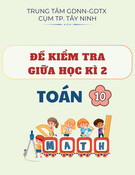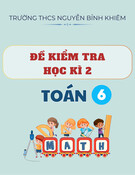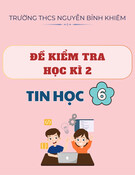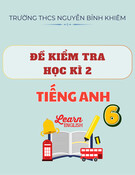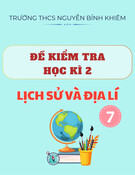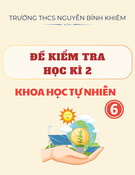
Trang 1 Mã đề 001
SỞ GD-ĐT QUẢNG TRỊ ĐỀ KIỂM TRA GIỮA HỌC KỲ I NĂM HỌC 2023-2024
TRƯỜNG PHỔ THÔNG DTNT TỈNH Môn: Tiếng anh Lớp: 12
Thời gian làm bài:60 phút, không kể thời gian giao đề
Họ và tên học sinh:………………..…..……………. Lớp:………
Mark the letter A, B, C or D on your answer sheet to indicate the words whose underlined part
differs from the other three in pronunciation in each of the following questions.
Question 1: A. explained B. rained C. arrived D. wanted
Question 2. A. bags B. kids C. speaks D. speeds
Mark the letter A, B, C, or D on your answer sheet to indicate the word that differs from the
other three in the position of stress in each of the following questions.
Question 3. A. discuss B. attract C. suppose D. gather
Question 4. A. national B. beautiful C. specific D. humorous
Mark the letter A, B, C, or D on your answer sheet to indicate the underlined part that needs
correction in each of the following questions.
Question 5. Mathematics, a required subject in all schools, divided into many branches.
A B C D
Question 6. By the time my mom comes bak home. I had done all the household chores.
A B C D
Question 7. He asked me where did I meet Mary the day before.
A B C D
Mark the letter A, B, C, or D to indicate the correct answer to each of the following question.
Question 8. We are a very __________family and very supportive of one another.
A. close -knit B. support C. close D. gathering
Question 9. I’ll send your regards to Marian as soon as I ________ in HCM city.
A. will arrive B. is going to arrive C. arrive D. arrived
Question 10. I am now ___________a lot of study pressure.
A. under B. in C. of D. at
Question 11. Peter asked Jane _________ the film on T.V the previous night.
A. why didn’t she watch B. why hadn’t she watched
C. why she didn’t watch D. why she hadn’t watched
Question 12. To attract someone’s attention, we can use verbal or ________ communication.
A. guestures B. non-verbal C. body language D. facial expression
Question 13. She _______ a terrible mistake of going against her doctor’s advice.
A. made B. paid C. gave D. did
Question 14. The mother told her son _______ so impolitely.
A. not behave B. not to behave C. not behaving D. did not behave
Question 15. Schooling is _____________for all English children from the age of 5 to 16.
A. compulsory B. ordinary C. open D. new
Question 16. A new primary school __________in my village.
A. is already building B. built C. has just been built D. has just built
Question 17. Thanks to his parent’s approval, he tried his best to win a _______ at a university.
A. place B. scholarship C. chosen D. acceptance
Question 18. Children who are isolated and lonely seem to have poor language and ________.
A. communicate B. communication C. communicative D. communicating
Question 19. When the lights __________, Hoa was watching TV at the living room.
A. were going out B. went out C. is going out D. have gone out
Mark the letter A, B, C, or D on your answer sheet to indicate the sentence that best completes
each of the following exchanges.
Đề KT chính thức
(Đề có 03 trang)
Mã đề:001

Trang 2 Mã đề 001
Question 20: Hana and Jennifer are talking about the book they have read.
- Hana: ‘The book is really interesting.’ - Jennifer: ‘______.’
A. I'd love to B. Don't mention it
C. I can't agree more D. It's nice of you to say so
Question 21: Linda: “What a gorgeous make-up style you have got, Jane!”
Marry: “___________________.”
A. I am afraid not. B. You are telling a joke.
C. Thank you for your compliment D. I don’t like your sayings
Mark the letter A, B, C, or D on your answer sheet to indicate the word CLOSEST in meaning
to the underlined word in each of the following questions.
Question 22. She got up late and rushed to the bus stop.
A. came into B. went leisurely C. went quickly D. dropped by
Question 23. Billy, come and give me a hand with cooking.
A. help B. prepared C. be busy D. attempt
Mark the letter A, B, C, or D on your answer sheet to indicate the word(s) OPPOSITE in
meaning to the underlined word(s) in each of the following questions.
Question 24. The parents always try to join hands to take care of their children and give them a
happy home.
A. separate B. combine C. connect D. help
Question 25. The academic year in Vietnam start early September.
A. at the beginning of B. in the middle of C. at the time of D. at the end of
Mark the letter A, B, C, or D on your answer sheet to indicate the sentence that is closest in
meaning to each of the following questions.
Question 26. They cancelled all flights because of fog.
A. All flights because of fog were cancelled.
B. All flights were cancelled because of fog.
C. All flights were cancelled by them because of fog.
D. All flights were because of fog cancelled.
Question 27 “I’ll tell you about this tomorrow, Mary.” said Tom.
A. Tom said to Mary that he will tell her about that the next day.
B. Tom told Mary that I would tell you about that the next day.
C. Tom told Mary that he would tell her about that the next day.
D. Tom told Mary that she would tell him about that the next day.
Question 28. The last time I went to the museum was a year ago.
A. I have not been to the museum for a year. B. A year ago, I often went to the museum.
C. My going to the museum lasted a year. D. At last I went to the museum after a year.
Mark the letter A, B, C, or D on your answer sheet to indicate the sentence that best combines
each pair of sentences in the following questions.
Question 29. I got downstairs. The phone stopped ringing.
A. Scarcely the phone had stopped ringing than I got downstairs.
B. After the phone had stopped ringing, I got downstairs.
C. Hardly had the phone stopped ringing when I got downstairs.
D. No sooner had I got downstairs than the phone stopped ringing.
Question 30. There is no need for you to redecorate your room.
A. You needn’t redecorate your room. B. You didn’t have to redecorate your room.
C. You didn’t need to redecorate your room. D. You mustn’t redecorate your room.
Read the following passage and mark the letter A, B, C, or D on your answer sheet to indicate
the correct word or phrase that best fits each of the numbered blanks.
Have you ever wondered what it would be like to live away from home while you attend
school? Would you like to have the (31)______ of living and studying with students from
different countries around the world? Cranbrook Kingswood School-is one of the few schools
(32)______ can offer you this kind of remarkable opportunity! Cranbrook's green, wooded

Trang 3 Mã đề 001
campus is a beautiful and safe living and learning environment The many buildings of Cranbrook
were designed by world-renowned architect. In fact, all of the furniture, woodwork, window glass
and tapestries at the school were specially designed for the school and made by hand. (33)
______ room and building was created to please and
(34) _____. The students of Cranbrook Kingswood are very competitive. Their studies are
challenging and prepare them for some of the best universities around the world. (35) ______ it's
not all hard work at Cranbrook! Students participate in a rich programme of athletics, music and
art courses. Clubs and other activities keep the students happy and busy during the year.
Question 31. A. need B. experience C. subject D. exploration
Question 32. A. they B. who C. that D. what
Question 33. A. Many B. Other C. Some D. Each
Question 34. A. inspire B. intend C. invest D. inquire
Question 35. A. But B. So C. And D. However
Read the following passage and mark the letter A, B, C, or D on your answer sheet to indicate
the correct answer to each of the questions.
BODY LANGUAGE AND CULTURAL DIFFERENCES
The body language people use often communicates more about their feelings than the
words they are saying. We use body movements, hand gestures, facial expressions, and changes
in our voice to communicate with each other. Although some body language is universal, many
gestures are culturally specific and may mean different things in different countries.
If you want to give someone the nod in Bulgaria, you have to nod your head to say no and shake
it to say yes – the exact opposite of what we do! In Belgium, pointing with your index finger or
snapping your fingers at someone is very rude.
In France, you shouldn’t rest your feet on tables or chairs. Speaking to someone with your
hands in your pockets will only make matters worse. In the Middle East, you should never show
the soles of your feet or shoes to others as it will be seen as a grave insult. When eating, only use
your right hand because they use their left hands when going to the bathroom.
In Bangladesh, the ‘thumbs-up’ is a rude sign. In Myanmar, people greet each other by
clapping, and in India, whistling in public is considered rude.
In Japan, you should not blow your nose in public, but you can burp at the end of a meal
to show that you have enjoyed it. The ‘OK’ sign (thumb and index finger forming a circle) means
‘everything is good’ in the West, but in China it means nothing or zero. In Japan, it means
money, and in the Middle East, it is a rude gesture.
Question 36. It is mentioned in the passage that many gestures_______________.
A. may mean different things in different countries B. are not used to communicate our feelings
C. can be used to greet each other in public D. are used in greeting among men and
women
Question 37. People nod their head to say no in ________________.
A. Belgium B. Bulgaria C. France D. Japan
Question 38. In the Middle East, people do not use their left hands for eating because they use
their left hands_______________.
A. when going to the bathroom B. when preparing the meal
C. to put in their pockets D. to clean their tables and chairs
Question 39. Which of the following is NOT true according to the passage?
A. In France, people shouldn’t rest their feet on tables.
B. In Belgium, snapping your fingers at someone is very rude.
C. In China, the ‘OK’ sign means money
D. In Myanmar, people greet each other by clapping
Question 40. The word “others” in paragraph 3 refers to _______________.
A. other people B. other shoes C. other soles D. other feet
__________THE END___________

Trang 4 Mã đề 001
SỞ GD-ĐT QUẢNG TRỊ ĐỀ KIỂM TRA GIỮA HỌC KỲ I NĂM HỌC 2023-2024
TRƯỜNG PHỔ THÔNG DTNT TỈNH Môn: Tiếng anh Lớp: 12
Thời gian làm bài:45 phút, không kể thời gian giao đề
Họ và tên học sinh:………………..……………. Lớp:………
Read the following passage and mark the letter A, B, C, or D on your answer sheet to indicate
the correct answer to each of the questions.
BODY LANGUAGE AND CULTURAL DIFFERENCES
The body language people use often communicates more about their feelings than the
words they are saying. We use body movements, hand gestures, facial expressions, and changes
in our voice to communicate with each other. Although some body language is universal, many
gestures are culturally specific and may mean different things in different countries.
If you want to give someone the nod in Bulgaria, you have to nod your head to say no and shake
it to say yes – the exact opposite of what we do! In Belgium, pointing with your index finger or
snapping your fingers at someone is very rude.
In France, you shouldn’t rest your feet on tables or chairs. Speaking to someone with your
hands in your pockets will only make matters worse. In the Middle East, you should never show
the soles of your feet or shoes to others as it will be seen as a grave insult. When eating, only use
your right hand because they use their left hands when going to the bathroom.
In Bangladesh, the ‘thumbs-up’ is a rude sign. In Myanmar, people greet each other by
clapping, and in India, whistling in public is considered rude.
In Japan, you should not blow your nose in public, but you can burp at the end of a meal
to show that you have enjoyed it. The ‘OK’ sign (thumb and index finger forming a circle) means
‘everything is good’ in the West, but in China it means nothing or zero. In Japan, it means
money, and in the Middle East, it is a rude gesture.
Question 1. It is mentioned in the passage that many gestures_______________.
A. may mean different things in different countries B. are not used to communicate our feelings
C. can be used to greet each other in public D. are used in greeting among men and women
Question 2. People nod their head to say no in ________________.
A. Belgium B. Bulgaria C. France D. Japan
Question 3. In the Middle East, people do not use their left hands for eating because they use their
left hands_______________.
A. when going to the bathroom B. when preparing the meal
C. to put in their pockets D. to clean their tables and chairs
Question 4. Which of the following is NOT true according to the passage?
A. In France, people shouldn’t rest their feet on tables.
B. In Belgium, snapping your fingers at someone is very rude.
C. In China, the ‘OK’ sign means money
D. In Myanmar, people greet each other by clapping
Question 5. The word “others” in paragraph 3 refers to _______________.
A. other people B. other shoes C. other soles D. other feet
Read the following passage and mark the letter A, B, C, or D on your answer sheet to indicate
the correct word or phrase that best fits each of the numbered blanks.
Have you ever wondered what it would be like to live away from home while you attend
school? Would you like to have the (6)______ of living and studying with students from different
countries around the world? Cranbrook Kingswood School-is one of the few schools (7)______
can offer you this kind of remarkable opportunity! Cranbrook's green, wooded campus is a
beautiful and safe living and learning environment The many buildings of Cranbrook were
designed by world-renowned architect. In fact, all of the furniture, woodwork, window glass and
Đề KT chính thức
(Đề có 03 trang)
Mã đề:002

Trang 5 Mã đề 001
tapestries at the school were specially designed for the school and made by hand. (8) ______
room and building was created to please and
(9) _____. The students of Cranbrook Kingswood are very competitive. Their studies are
challenging and prepare them for some of the best universities around the world. (10) ______ it's
not all hard work at Cranbrook! Students participate in a rich programme of athletics, music and
art courses. Clubs and other activities keep the students happy and busy during the year.
Question 6. A. need B. experience C. subject D. exploration
Question 7. A. they B. who C. that D. what
Question 8. A. Many B. Other C. Some D. Each
Question 9. A. inspire B. intend C. invest D. inquire
Question 10. A. But B. So C. And D. However
Mark the letter A, B, C, or D to indicate the correct answer to each of the following question.
Question 11. We are a very __________family and very supportive of one another.
A. close -knit B. support C. close D. gathering
Question 12. I’ll send your regards to Marian as soon as I ________ in HCM city.
A. will arrive B. is going to arrive C. arrive D. arrived
Question 13. I am now ___________a lot of study pressure.
A. under B. in C. of D. at
Question 14. Peter asked Jane _________ the film on T.V the previous night.
A. why didn’t she watch B. why hadn’t she watched
C. why she didn’t watch D. why she hadn’t watched
Question 15. To attract someone’s attention, we can use verbal or ________ communication.
A. guestures B. non-verbal C. body language D. facial expression
Question 16. She _______ a terrible mistake of going against her doctor’s advice.
A. made B. paid C. gave D. did
Question 17. The mother told her son _______ so impolitely.
A. not behave B. not to behave C. not behaving D. did not behave
Question 18. Schooling is _____________for all English children from the age of 5 to 16.
A. compulsory B. ordinary C. open D. new
Question 19. A new primary school __________in my village.
A. is already building B. built C. has just been built D. has just built
Question 20. Thanks to his parent’s approval, he tried his best to win a _______ at a university.
A. place B. scholarship C. chosen D. acceptance
Question 21. Children who are isolated and lonely seem to have poor language and ________.
A. communicate B. communication C. communicative D. communicating
Question 22. When the lights __________, Hoa was watching TV at the living room.
A. were going out B. went out C. is going out D. have gone out
Mark the letter A, B, C, or D on your answer sheet to indicate the sentence that best completes
each of the following exchanges.
Question 23: Hana and Jennifer are talking about the book they have read.
- Hana: ‘The book is really interesting.’ - Jennifer: ‘______.’
A. I'd love to B. Don't mention it
C. I can't agree more D. It's nice of you to say so
Question 24: Linda: “What a gorgeous make-up style you have got, Jane!”
Marry: “___________________.”
A. I am afraid not. B. You are telling a joke.
C. Thank you for your compliment D. I don’t like your sayings
Mark the letter A, B, C, or D on your answer sheet to indicate the word CLOSEST in meaning
to the underlined word in each of the following questions.
Question 25. She got up late and rushed to the bus stop.
A. came into B. went leisurely C. went quickly D. dropped by
Question 26. Billy, come and give me a hand with cooking.


![Đề thi Tiếng Anh có đáp án [kèm lời giải chi tiết]](https://cdn.tailieu.vn/images/document/thumbnail/2025/20250810/duykpmg/135x160/64731754886819.jpg)
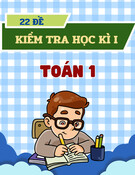
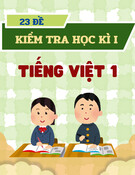

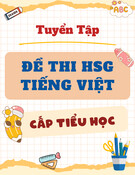
![Đề thi học kì 2 Vật lý lớp 11: Đề minh họa [Mới nhất]](https://cdn.tailieu.vn/images/document/thumbnail/2025/20250709/linhnhil/135x160/711752026408.jpg)
